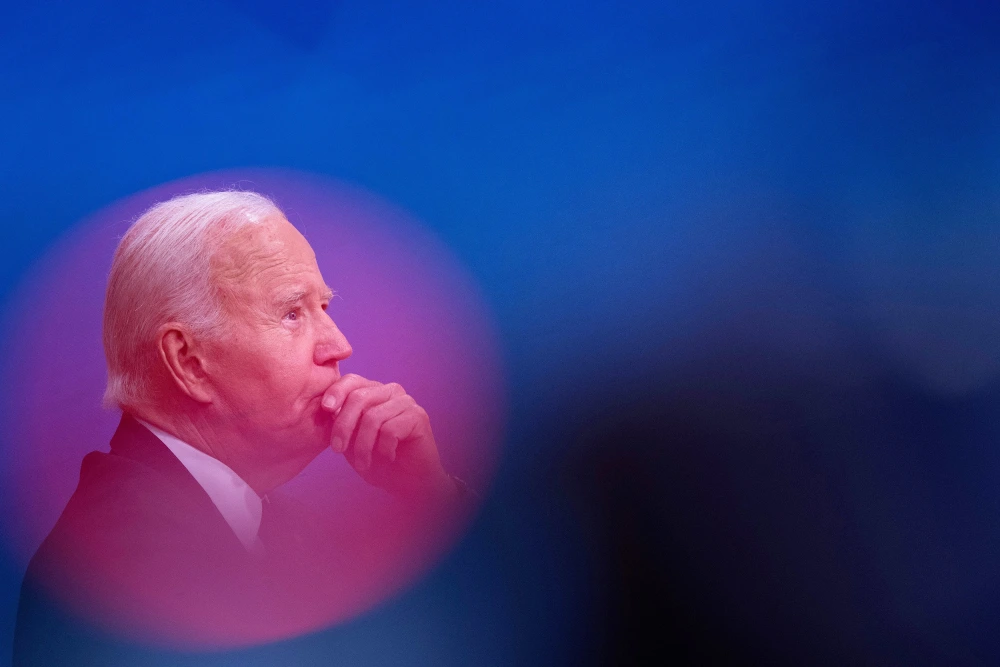For a society that appears evenly divided on politics and polarized on many cultural issues, a strong majority agrees on one thing: they do not like Biden’s administration.
Despite the intrigues that kept President Joe Biden off the ballot this election season, his unpopularity remains the election’s mood music.
From his border policies to the economy he has presided over to global chaos, there isn’t much about Biden’s presidency that voters like right now. It’s why former President Donald Trump has a 50-50 chance of returning to the White House, barely four years after voters ousted him.
Of course, the reason Trump’s prospects aren’t better than 50-50 is that Democrats finally read the room and shifted from Biden to Vice President Kamala Harris. Bottom line: It’s evident now in retrospect — and perhaps it would have been regardless of that disastrous debate performance — that Biden simply didn’t have a winning hand to run on. All he had was reaction over Jan. 6 and abortion, and while both topics resonate with a sizable portion of the population, they couldn’t carry him across the finish line.
However, even though Biden is no longer on the ballot, voters are still feeling his influence. They clearly do not want a candidate who reminds them of Biden.
Let us set the scenario. In the most recent AWN poll, 54% of respondents disapprove of Biden’s job performance. This is his “best” disapproval rating of the year, lower than the 56% who disapproved before he dropped out in April and the staggering 60% who disapproved at the start of this year. Arguably, the more inflation was felt across the country, the more the public expressed dissatisfaction of Biden’s employment.
To delve deeper, we tested the term “Bidenomics” in the most recent AWN poll, and how respondents responded to it reveals even more about the issue Harris faces as Biden’s vice president.
Voters perceive the term “Bidenomics” unfavorably by a 2-to-1 ratio (22% positive, 46% negative), including almost one-fifth of all voters who our pollsters refer to as “swing voters” – people who haven’t voted straight Republican or Democratic for President since 2016.
To give you an idea of where this 21% of the electorate is politically right now, in our poll, these voters liked Trump over Harris by 7 percentage points — yet they preferred Democratic control of Congress by 4 points.
When you look deeper into the “swing voter” category, you’ll notice “Bidenomics” is much more damaging for Harris. The word has a positive/negative split among self-identified independent voters (16%-49%). “Bidenomics” does not fare much better among suburban women (26%-37%), white women (22%-47%), or women aged 50 and up (30%-45%).
Harris must perform well in all of these voting categories if she is to win the election.
(By the way, even among Democrats, “Bidenomics” is only marginally popular, with 31% seeing the phrase positively and 25% negatively. The fact that one-fourth of Democrats oppose the name “Bidenomics” is a red-light political emergency.
That’s why Harris’ comment on “The View” last week might be so catastrophic to her campaign with only a few weeks till Election Day. When asked to identify a decision Biden made as president that she would have made differently, she replied, “There isn’t one that comes to mind.”
It’s a phrase that might haunt her in the last weeks of the campaign — or even for years if she loses, as John Kerry did after his infamous 2004 statement on Iraq War funding: “I actually did vote for the $87 billion — before I voted against it.”
Kerry tried to explain the difference between two distinct war funding votes he took in 2004, but the way he said it confirmed a picture George W. Bush’s team was trying to paint: Kerry was indecisive and a flip-flopper. When you lose a tight race, like Kerry did in 2004, there are various factors to consider. However, in terms of message, this comment was terrible for him, and it hung over the entire campaign.
Similarly, this year, the GOP has seized every opportunity to reduce the election into a simple referendum on the party in power. As previously stated, Biden is unpopular both personally and professionally. In fact, Biden is now more unpopular than Harris or Trump. “There is nothing that comes to mind” fits right in.
Those who already support Biden’s term or dislike Trump may dismiss Harris’ comments as insignificant. Remember, the voters who will decide this election aren’t as enthusiastic about Trump’s actions. If they were, they wouldn’t be swing voters now.
The track record of sitting vice presidents in the modern political era (which I define as post-World War II) is not outstanding. Only one of the four who attempted to succeed their sitting presidents won: George H.W. Bush, 1988. Richard Nixon in 1960, Hubert Humphrey in 1968, and Al Gore in 2000 all lost very tight elections. If Harris falls short, it will be reminiscent of Gore, Humphrey, or Nixon – another razor-thin contest involving a sitting vice president.
Between now and Election Day, I expect Harris to find new ways to distance herself from Biden. But the clock is ticking, and her comment last week implies she has more work to do with less time.
Meanwhile, there is one facet of Biden’s unpopularity that should concern Trump: his age. As the oldest candidate running, his mental and physical stamina are being scrutinized more closely. If a Biden “hangover” turns up damaging Trump more than Biden, it implies Harris’ team has effectively weaponized his age. Let’s see how this works out.
